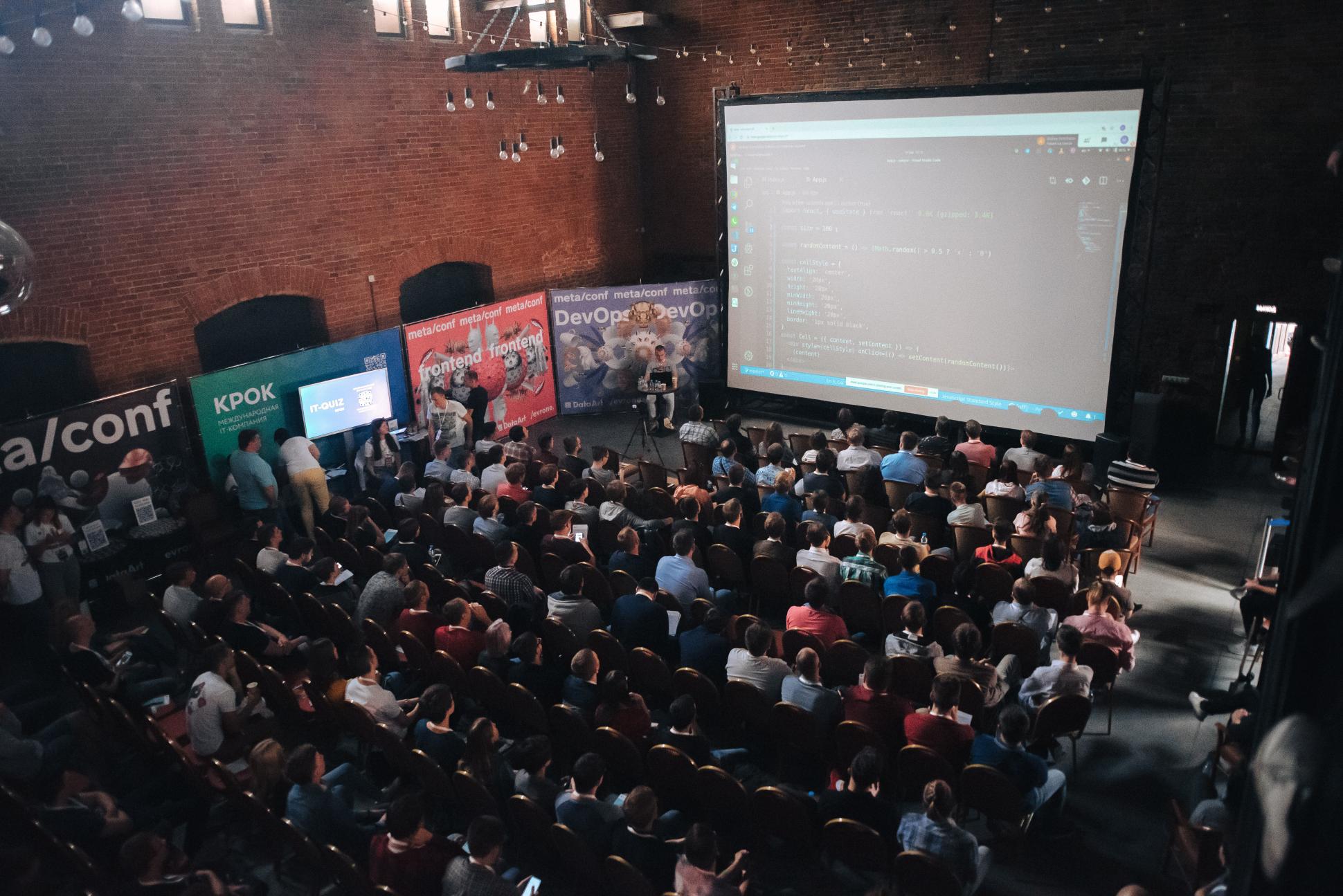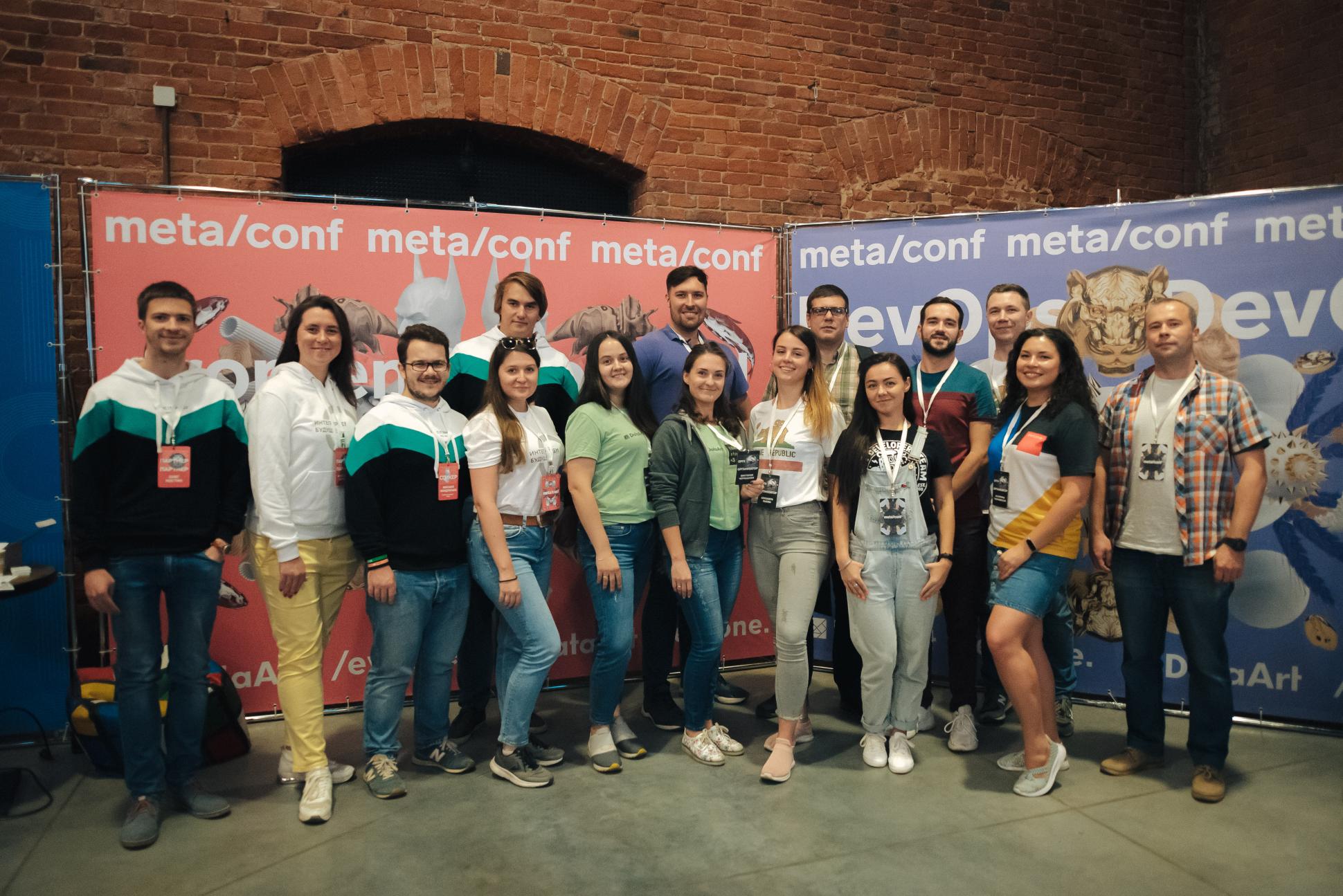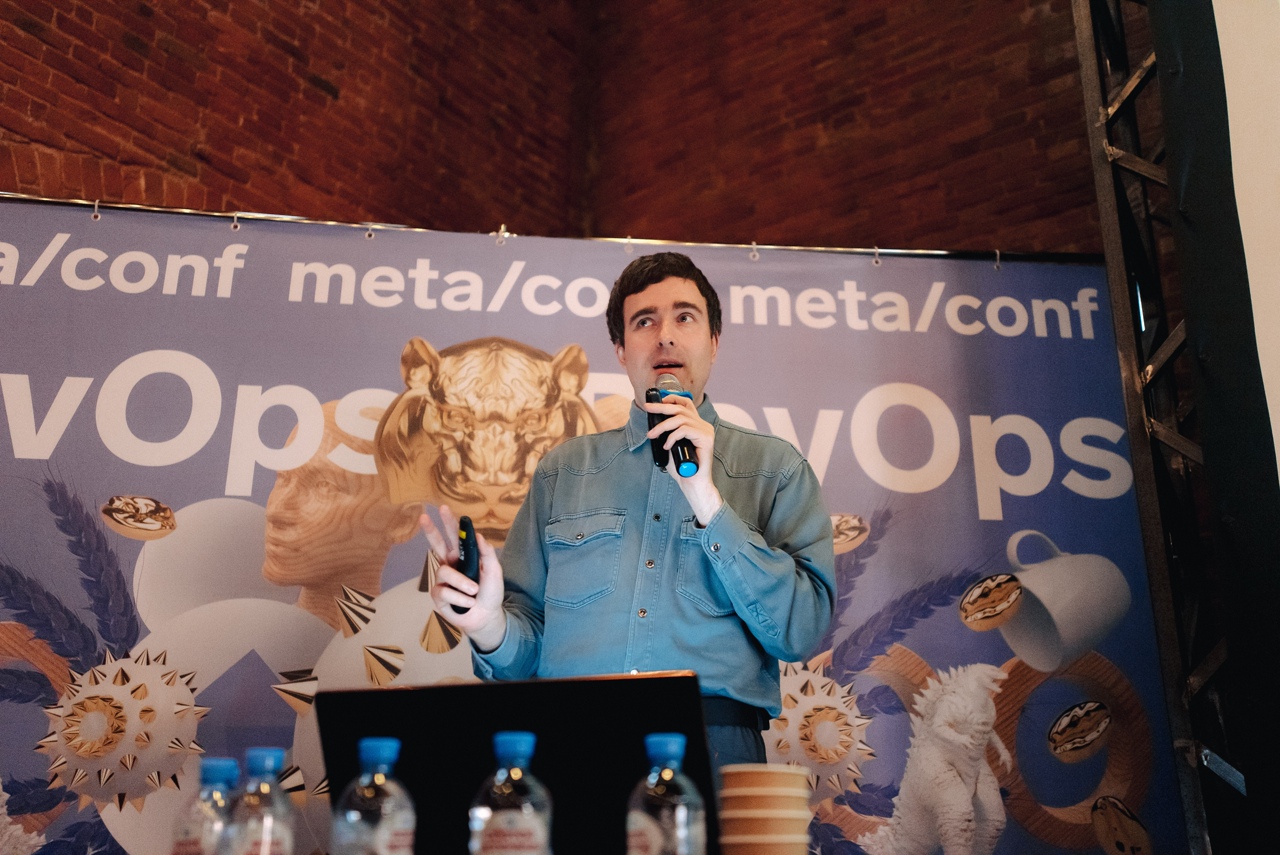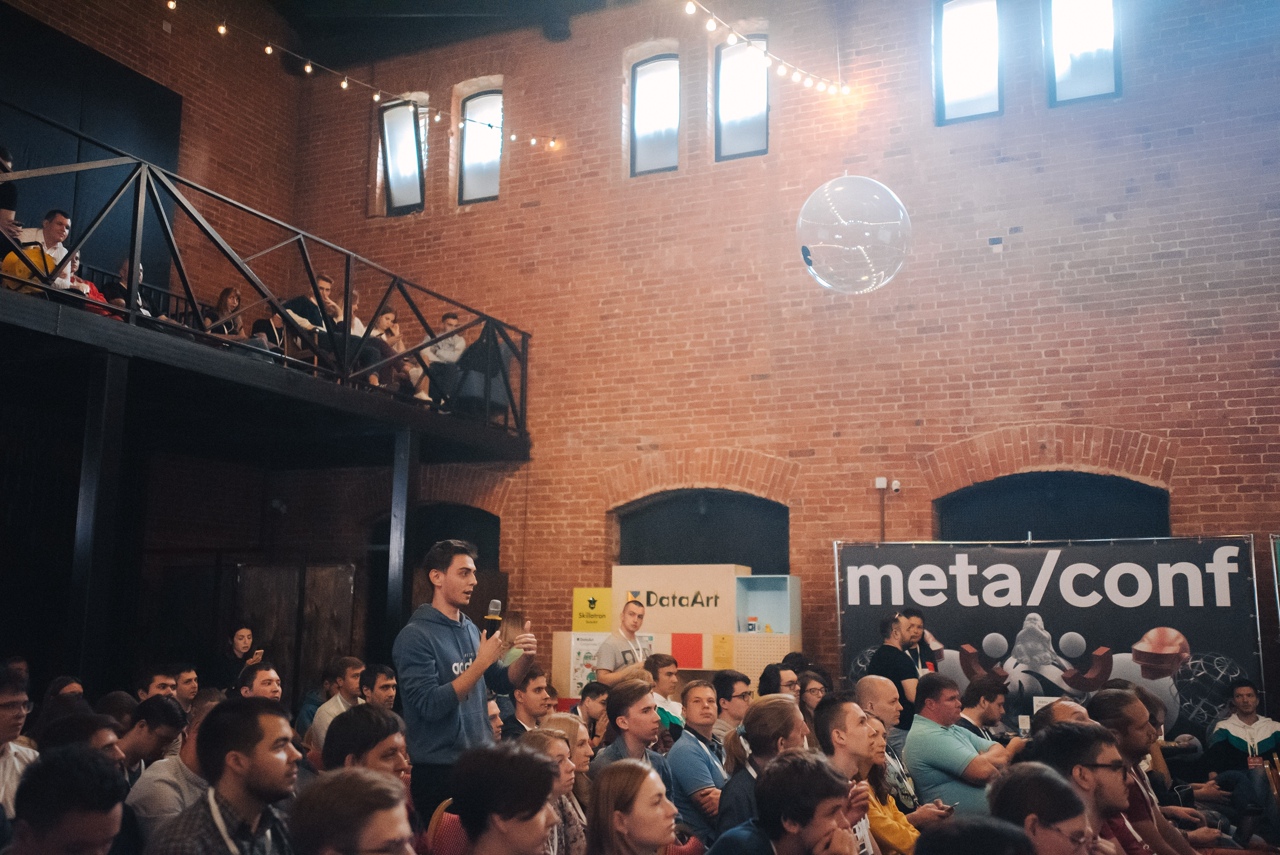How moving online helped us scale regional meetups
In this article we share tips on how moving online can help you scale regional meetups into an extensive online conference, how to choose a guest speaker, find partnering to host events & turn any crisis moments into growth points
One of the group of development offices of Evrone around the world is located in Voronezh. We have a large, active technical community, and we wanted to create an alternative to the big conferences for developers. So we came up with Meta/Conf, which is a series of IT meetups that allow us to get together, discuss technologies, and find like-minded people. Instead of "industry celebrities'', we strive to attract practicing, but not so well-known, developers, to discuss current issues and technologies.
In 2019, all of our events were held offline, but we still gathered participants from several neighboring regions. However, 2020 had a very strong impact on the event industry and we had to digitalize. We were able to turn crisis moments into growth points, figure out how to host the event online, and scale a series of small regional meetups into a more extensive online conference.
The venue
During offline times, we always tried to find an unusual location in the city for each event. For example, the front-end meetup would be held at the Loft, while the DevOps meetup was held at a restaurant with a panoramic view of the city. Our participants liked it, since they were tired of sitting in stuffy conference rooms at hotels. At every event, we organized coffee breaks for people to get to know each other and chat, and we managed to combine an educational event and a cool get-together into one format.
It is impossible to mimic this full experience online, therefore, we focused on making the performances interesting and relevant, so that the knowledge could be used immediately. To do this, we attracted lesser-known specialists from partner companies, who work every day with the technologies they spoke about. Each performance was unique and specially prepared for the meetup - in contrast to the "touring" reports that IT stars often give at multiple large conferences.


Content quality for online conferences
All incoming applications from speakers have always been evaluated by the program committee. They reject overly simple or complicated reports and make sure the topic is relevant or interesting. So, in terms of report content quality, nothing really changed. But for viewers, Meta/Conf became more streamlined and accessible when it went online.
Previously, visitors had to choose seats in the auditorium based on their goals: if you wanted to listen to a report, you sat in the front rows. If you planned to immediately discuss it with colleagues and new acquaintances, you chose a place farther away. But this was not a perfect system, and it often grew too noisy or the screen was blocked by the people sitting in front.
Another obvious disadvantage of offline is that no event is immune from technical problems: the batteries in the microphone die, the presentation doesn’t open correctly, etc.
But when hosting virtual meetings, it is much easier to solve these problems. First, at an online conference, every spectator is in the first row. And everyone can choose for themselves whether or not they want to participate in the chat or ask questions. We found that participants actually asked a lot more questions online than they typically do at live events.
Second, there are fewer technical problems, especially if you use a reliable streaming platform. We tried three before we found one that met our needs and standards. Short of the speaker's Internet connection failing, there are not many technical issues that can’t be quickly resolved. Nearly everyone has a camera and microphone on their computer and their phone, so it’s easy to connect to the conference from anywhere.


Format changes
Our initial goal for Meta/Conf was to hold IT conferences and show that there is also a technical community and cool specialists outside of Moscow/St. Petersburg. In this sense, we consider every event held in 2019 and early 2020 to be successful, as we managed to collect a hundred participants for each topic and learned quite a bit about how to scale local events.
With the transition to the Internet, we, of course, lost the already assembled community. But this rollback became an opportunity for us to reformat and turn a series of events into a full software engineering conference. Meta/Conf already had a design, and now we have developed a separate promotion strategy for it. We receive 300–400 registrations and 100–200 visitors at a time, plus an additional 100-400 viewers of the reports on YouTube. We’ve found a new market and measure of success for the small Meta/Conf from Voronezh, but there is still room to grow.
What did we achieve?
The biggest achievement of the year was the fact that we managed to, not only transfer the tech conference online, but also rebuild the community around it. We are constantly included in IT event calendars and on the mailing lists of local communities, indicating that people are talking about us. Another good sign is the widespread locations of the participants, as our meetups are now watched in at least 35 cities in Russia and 20 more cities throughout the world.
What were the meetups?
In 2020, we held four traditional meetups for backend, frontend, DevOps, and QA, plus three experimental meetups for .NET, Scala, and general business.
.NET was a new topic for us, and this meetup had the lowest number of participants. However, we also used it to test several different advertising channels and ways to promote an event online. We found that social networks brought less than 5% of registrations, while the champion was Telegram.
The business meetup was an opportunity for us to work with a non-technical audience: high-level managers and product owners. We knew in advance that this meetup would not generate as much interest, but we still managed to gather a decent number of participants and discuss many questions that they had.
The most successful was the Scala meetup. The essence of the experiment was to gather an audience that is rather difficult to target through online event promotion, in comparison to Java, for example, where you can just do advertising bombing and get hundreds of registrations. There were very few advertising channels to use, but we managed to collect more than 300 applications and over 100 participants. Based on the original plan, this was a super success.
What plans do we have?
When we realized in March 2020 that the whole concept of Meta/Conf would have to be changed, it was difficult. Despite the state of the world, we were expected to organize and conduct a programming & software development conference from scratch. We had so many questions and took some risks, but in the end, we were able to find a successful format and a reliable platform, and did not disappoint those who came for new and interesting information.
While we have learned a lot of new tricks and tips for hosting a virtual meeting, there is, however, one problem that we have not yet been able to solve - people are simply tired. Online conferences around software development are held every week, and the flow of information becomes overwhelming, making it more and more difficult to choose and commit to an event.
So, what will future meetups look like? We want to take advantage of the best of both versions. Safe meetups will be held offline for those who want to get together in-person. Admission to them will be paid, but affordable, to discourage attendance by those who go to all events just for the free merchandise. However, all of the reports from these events will also be recorded and broadcast online so they can be viewed from anywhere in the world.